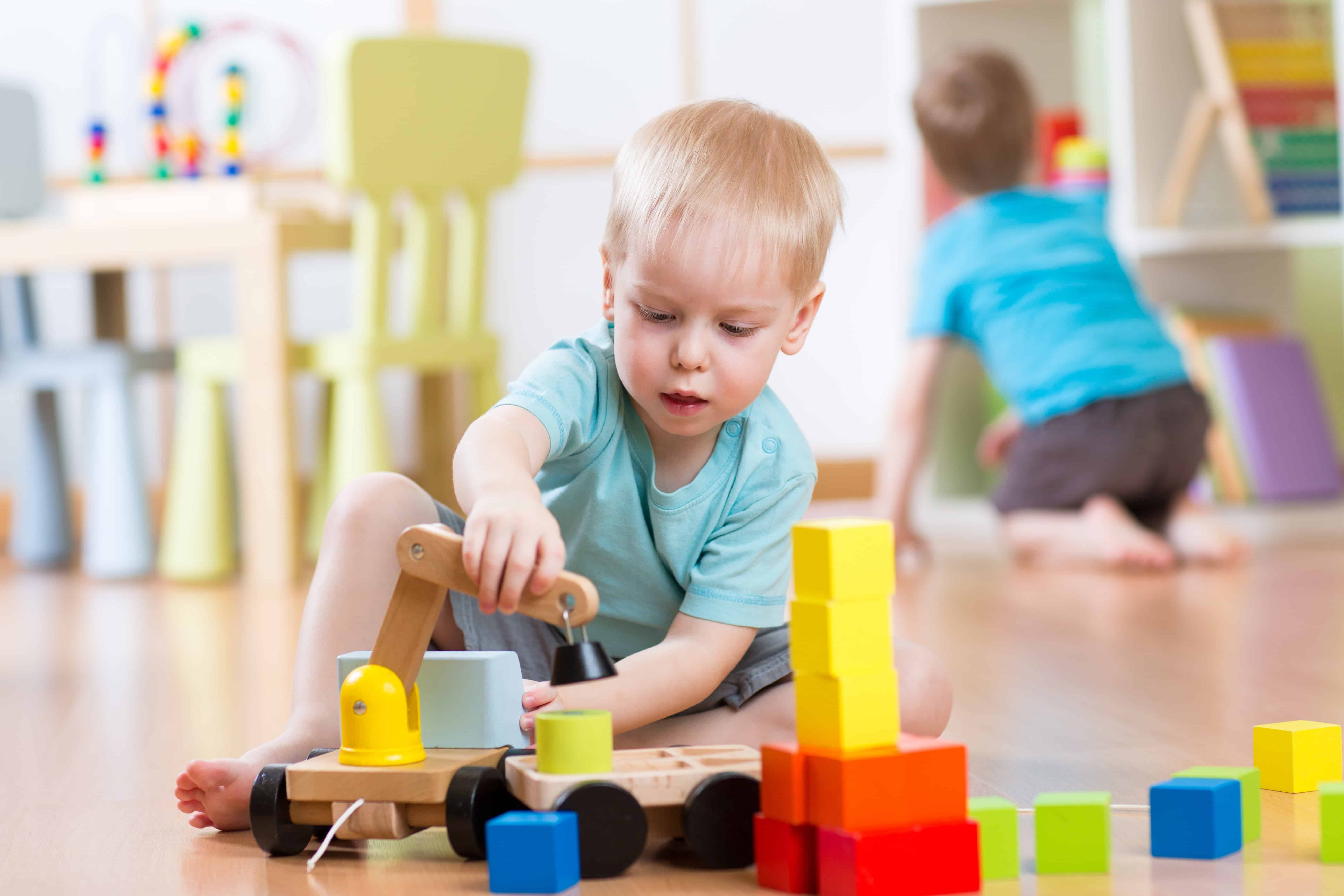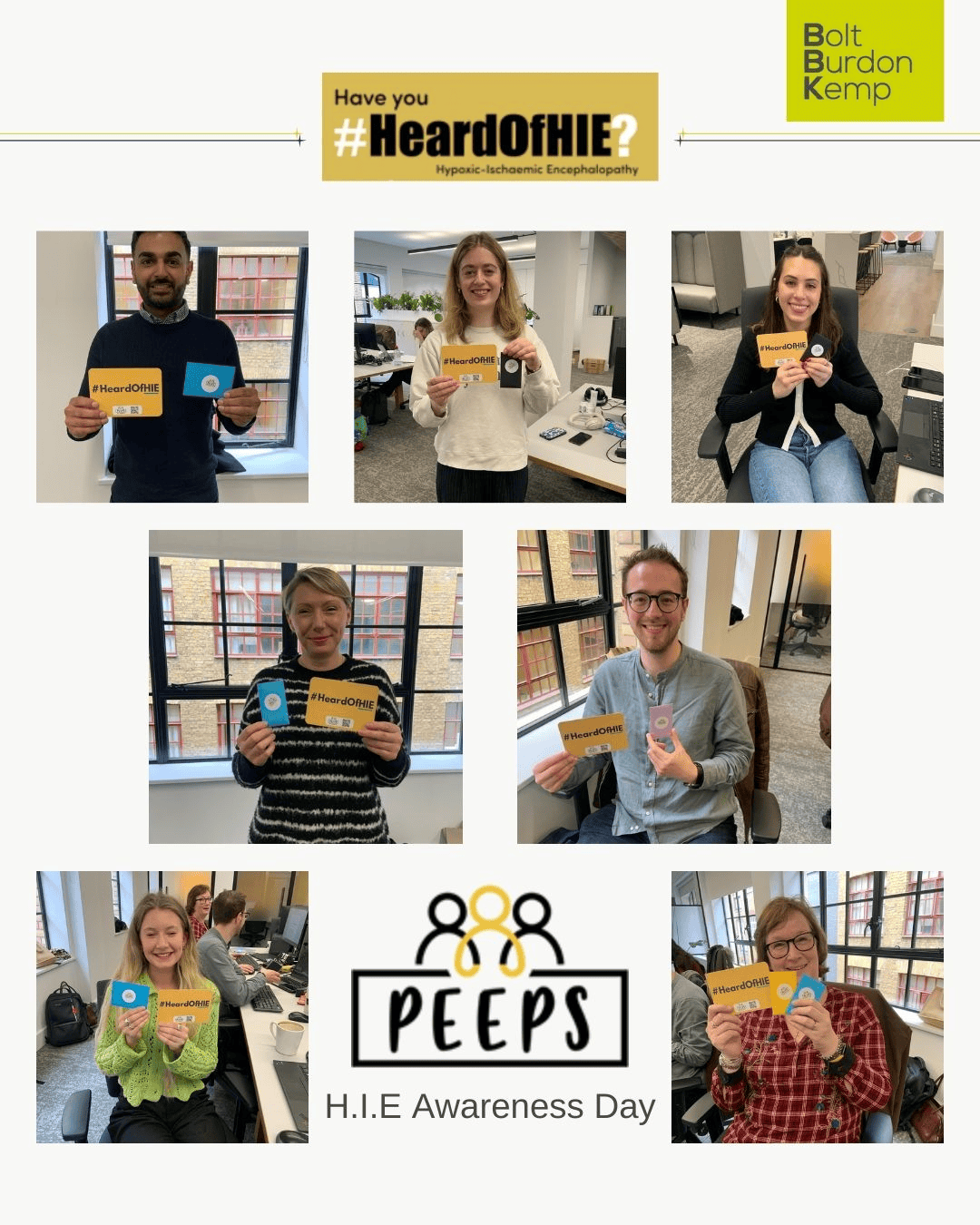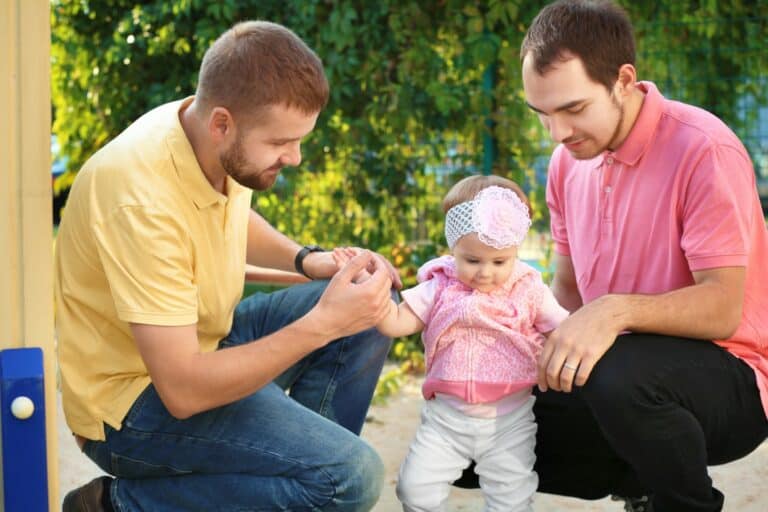
Have you #HeardofHIE? The brain injury affecting 50 UK babies a week
Have you #HeardofHIE?
Most people haven’t, even though it’s the second leading cause of infant mortality and lifelong disability worldwide and affects about 50 babies in the UK every week.
H.I.E. stands for Hypoxic Ischemic Encephalopathy, a type of neonatal and paediatric brain injury. April is H.I.E. Awareness Month, so Bolt Burdon Kemp is joining the H.I.E. global community to raise awareness of this type of brain injury that affects three-four babies in every 1000 in the UK. We want to highlight the valuable work of Peeps-H.I.E. in raising awareness and advocating for education and support for the thousands of families affected every year, and we want to share one of our stories of HIE, to honour the amazing children and families we’ve had the privilege of supporting in their fight for justice.
What is H.I.E.?
H.I.E. stands for Hypoxic (lack of oxygen) Ischemic (restricting blood flow) Encephalopathy (affecting the brain).
When the brain is deprived of oxygen, brain cells are injured. Some may recover, some may die.
The most common causes of oxygen deprivation to the brain are low levels of oxygen in the blood or a reduced flow of oxygen to the brain. This can happen in a variety of ways prior to birth, during the birth process, after birth, and during childhood.
H.I.E. has many causes, including placental insufficiency, uterine rupture, placental abruption, true umbilical knots, cord compression, maternal blood clotting disorders, foetal maternal haemorrhage, extremely low maternal blood pressure, trauma during delivery, placental blood clots, shoulder dystocia, cord prolapse, aneurysm rupture, cardiac arrest and near Sudden Infant Death Syndrome (SIDS) events.
The only current treatment that has shown clinical benefit immediately after injury is therapeutic hypothermia (also known as cooling). Multiple studies have shown a reduction in death and disability, depending on severity.
Those affected may still need other medical interventions to support their organs or to treat seizures as they recover.
Outcomes are wide-ranging and no two children will be the same. The impact of each child’s injury is different based on multiple factors, including what parts of the brain are affected and how damaging the injury was to the brain.
Statistics show:
- 75-80% survive,
- 50-70% experience seizures,
- 40-50% develop a permanent developmental disability, such as cerebral palsy, epilepsy, vision loss, hearing loss, feeding issues, cognitive issues, speech delays or global delays.
Why does H.I.E. awareness matter?
Most H.I.E. babies are typically near or full term, born extremely ill, and go through a unique NICU (Neonatal Intensive Care Unit) experience. But disparities in care, communication, and connection for HIE families continue to be barriers to supporting these babies and their families. For example:
- Recognising the signs of H.I.E. promptly is essential for prompt management but lack of awareness among parents and healthcare providers about H.I.E. symptoms and risk factors can delay early intervention.
- Even if signs are recognised, transporting critically ill newborns to specialist neonatal centres with expertise in managing H.I.E. can be challenging due to geography or lack of resources.
- Comprehensive care for H.I.E. babies involves various medical interventions, therapies, and follow-up assessments but families may face financial difficulties in covering the expenses of prolonged hospital stays and travel to appointments therapies, and rehabilitation.
- Parents of H.I.E. babies often experience emotional distress, anxiety and uncertainty about their child’s future, but lack of adequate emotional support can hinder coping mechanisms and impact the overall well-being of the family.
- Coordinating care across different healthcare providers (neonatologists, neurologists, therapists) can be complex, and fragmented services may lead to gaps in care and delayed interventions.
- Ensuring consistent follow-up visits and assessments is crucial for checking developmental progress, but barriers such as transportation, work schedules, and lack of awareness may affect adherence to follow-up appointments.
- Children with H.I.E. may have learning difficulties, speech delays, or motor impairments so access to early intervention programs, special education services, and individualised learning plans is essential, but often hard to access.
Our Bolt Burdon Kemp specialist child brain injury team often acts for children whose H.I.E. has been caused by medical negligence and we know how life-changing it is for the whole family.
Recently we secured a settlement against North Middlesex University Hospital NHS Trust for a child who suffered severe perinatal hypoxic ischaemic encephalopathy due to inadequate foetal monitoring during the mother’s labour. The child needed immediate medical intervention on delivery, including resuscitation, ventilation, and intubation. They now have severe cerebral palsy affecting all four limbs, epilepsy, visual impairment, double incontinence, profound learning difficulties, and rely on tube feeding. They are non-verbal and completely dependent on others for their all care and mobility needs.
We worked closely with the child’s mother, whose selfless devotion and courage, was – as is invariably the case – an inspiration to us all, to secure through the settlement a new, fully adapted and equipped home, a comprehensive care and rehabilitation programme, and an Education, Health and Care (EHC) plan, giving the child the best quality of life possible and the mother peace of mind that her child’s lifelong needs will be met.
Who are Peeps-H.I.E.?
Peeps-HIE is the only UK charity dedicated to championing awareness and support of all those affected by H.I.E.
Its vision is that every person in the UK touched by H.I.E. can access proper support at any time.
The charity recognises supporting HIE babies requires a collaborative effort from healthcare professionals, families, and communities, so it actively tries and work with other individuals and organisations to ensure all voices are heard and the right support can be provided at the right time, whether that’s now or in the future.
As well as providing information for parents in hospitals or online, and signposting families to other support, Peeps-HIE helps in three crucial ways:
- Through its Buddy/Peer Support scheme, it puts families in touch with parents who have been through similar experiences, either for a one-off chat, or for more regular support, over the phone, Zoom, via email, WhatsApp or, if local, in person. It also hosts free online sessions and Peeps Together meet-ups, with details published on its website or social media. There is also informal peer support via the closed Facebook group “Little HIEroes” with a focus on the early weeks/months/years following an H.I.E. event.
- Through its Counselling and Trauma Therapy UK network it can put families who are experiencing emotional distress, anxiety, and uncertainty in touch with a trained counsellor or trauma therapist for professional emotional support.
- Through its Allocated Funding, it can offer funding towards the costs of equipment that isn’t available through the NHS, as well as support with accommodation or travel costs if there is a hospital stay.
Bolt Burdon Kemp is proud to support Peeps-HIE in its mission and regularly takes on fundraising challenges such as fire and glass walking, which you can read more about here.
Please join us in raising awareness of H.I.E. this month – and especially on H.I.E. Awareness Day on 4 April – by sharing this blog on your social media, using #HeardofHIE. The more we can encourage people to talk about HIE the better.











